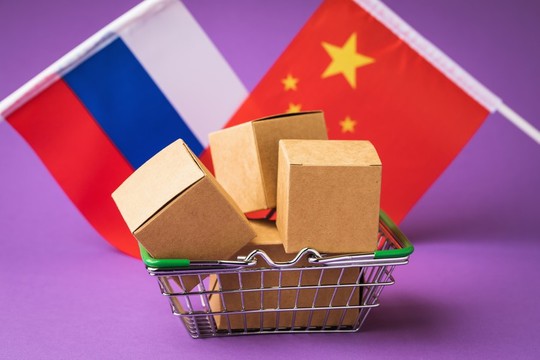Photo: haymarketmedia.asia
China's two-way trade with Russia reached a record value of $240 billion, while Russia’s export trade value with Asia rose significantly in 2023.
"Actually, we have seen the trend of Russian brands entering the Asian market since 2014," said Vadim Tylik, CEO of RMAA, a cross-border marketing agency that connects consumer brands with Russian-speaking audiences, ‘Campaign Asia-Pacific’ informs.
Since 2014, in terms of Russian brands entering APAC markets, Tylik and his team at RMAA have helped promote a Russian peat company to increase its recognition and get new orders on the Chinese market. They have also been actively promoting small and medium-sized businesses (services, cabs, shopping malls) interested in Chinese outbound tourists as well as promoting a number of investment forums aimed at attracting investors from China to CIS countries (including Russia and Kazakhstan).
However, in 2022, Tylik says there was a realisation that the situation had changed a lot and brands took a wait-and-see attitude.
But demand rose once more in 2023 as Russia's economic condition grew more stable, and there is currently a significant tendency towards the economies converging. But while Russian brands continue to think about entering the Asian market, Tylik says there is often an issue with the category of brands.
"There are not many consumer brands in Russia like the Dodo-pizza chain, for example, which is making international expansion. There are food producers who are entering through ecommerce.
While an exhaustive list of global brands have ceased or have halted operations in Russia — among them McDonald's, Apple, Nike and Google — those on the ground say that because of foreign players leaving, a lot of space has been freed up inside Russia.
A spokesperson for one of Russia's top three marketing agencies, who preferred not to be named, said that while his agency group has not worked with any Russian brands in APAC, it’s mostly been the other way around.
"After many Western brands decided to leave the market, it's driven brands from APAC to the Russian market," said the agency spokesperson. "They enjoy much less competition as previous top spenders have disappeared; hence less investment is needed to establish and increase market share. One clear example would be the automotive segment as many Chinese car brands have entered the market here in Russia, taking it by storm."
In fact, Xinhua reported that according to a recent study by the auto business unit of Russia's Otkritie Bank, Chinese automakers achieved record sales of 553,000 cars in Russia in 2023, accounting for 49% of the nation's auto market. The share of Chinese cars in the Russian market more than doubled from the previous year. While the likes of Mercedes-Benz, Renault and Nissan exited owing to Western sanctions, according to Russian auto market analyst Autostat, they have been replaced by Chinese automakers such as Haval, Chery and Geely, making up six of the top 10 car sales in Russia last year.
Meanwhile, much like automakers, Chinese app publishers have also been seizing the Russian market as a new market for expansion. In fact, Chinese app publishers have been turning to Yandex Advertising Network to help them tap into the Russian market that boasts over 170 million smartphone users.
"Last year China became our top market in terms of the quantity of partners working with Yandex Advertising Network," said Valentina Petrova, head of in-app partnerships in Asia, Yandex Ads. "We see a growing interest towards the market from all kinds of businesses: from app publishers to companies looking to advertise their products and services to Russian consumers and businesses. This comes as no surprise considering that the volume of trade between China and Russia is on the rise."
Rose, a US-based creative marketing agency, was the first and longest-running international agency in the former Soviet Union. In 2022, it expanded its operations to Dubai, recognising the timely opportunity to leverage the expansion of Russian-speaking consumers in this vibrant market.
"The current geopolitical landscape and a huge wave of Russian immigrants have prompted the expansion of Russian communications agencies into international markets, particularly in Dubai, where Russian businesses and brands have already established a strong presence," said Galina Savina, general director of Rose. "Just within 2022 and 2023 the number of Russian brands grew five times."
Galina added that over the past two years, she has witnessed more than 30 Russian-language online media outlets and Telegram blogs being launched in the UAE, and Russian-language advertising for real estate and lifestyle communications is becoming increasingly essential.
"This brand globalisation in some cases results in international operations surpassing those within Russia — a phenomenon that was already emerging for some brands," added Galina. "As geopolitical factors persist, this trend will continue to grow globally."
"Speaking of the difficulties of entering the Asian market — it is a completely different mentality and a new incomprehensible consumer for an entrepreneur from Russia," said Tylik.
"Often to build a business model, brands need to be present in the Asian market to understand the Asian consumer, and this is a completely different level of investment. Complicating the situation of entering the market is a completely different digital ecosystem, and all the promotion channels are completely new. Some are ready to enter only through marketplaces, others through retail."
And while there are obvious advantages to breaking into the APAC market — its very big consumer base being the main one—it seems, at least for now, many Russian brands are currently more concerned with growing their market share within their own country.
"While APAC does have a very big consumer base, a lot of investment would be required to breakthrough existing competitive clutter and established market segments," says the aforementioned spokesperson. "I am sure Russian brands have a lot to offer to APAC consumers being high quality. However, I believe they are more focused on increasing market share in their home market of Russia."
read more in our Telegram-channel https://t.me/The_International_Affairs

 11:39 25.04.2024 •
11:39 25.04.2024 •























